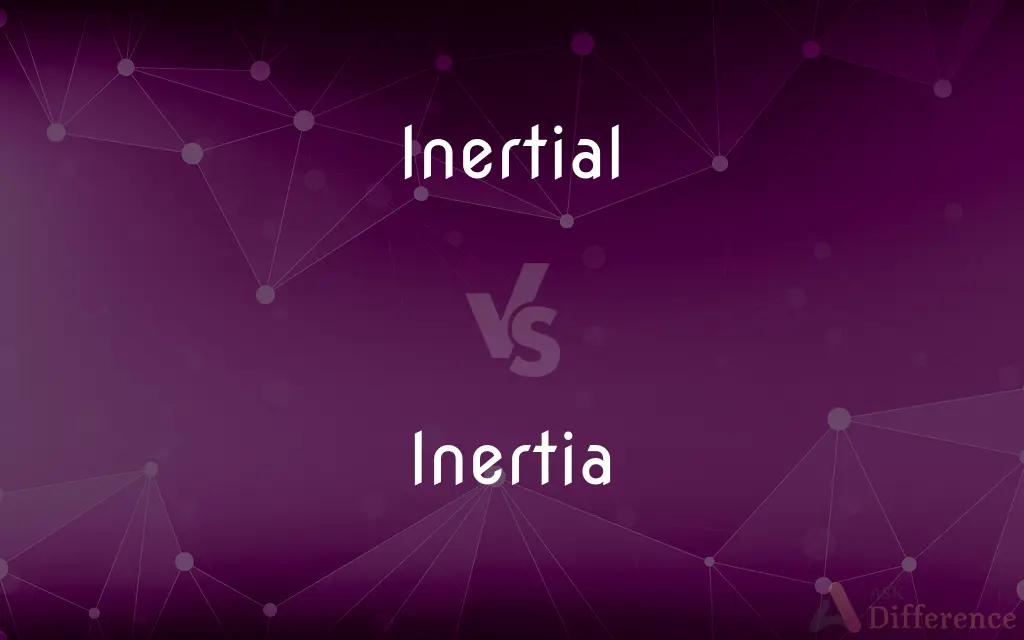Inertial vs. Inertia — What's the Difference?
By Maham Liaqat & Fiza Rafique — Updated on April 2, 2024
Inertial relates to inertia, the property of matter, while inertia is the resistance to change in motion.

Difference Between Inertial and Inertia
Table of Contents
ADVERTISEMENT
Key Differences
Inertial is an adjective describing systems or components that are affected by or utilize inertia, the tendency of an object to resist changes in its state of motion. Inertia, on the other hand, is a noun referring to this fundamental physical property itself. While inertial systems may include devices like inertial guidance systems in aircraft, which rely on the concept of inertia to navigate, inertia describes the broader principle that an object will remain at rest or in uniform motion unless acted upon by an external force.
Inertial properties are crucial in the design of various technologies, especially in the fields of aerospace and automotive engineering, where understanding how systems react to forces is essential for stability and control. In contrast, inertia is a concept studied in physics to understand the behavior of objects when forces are applied, encompassing both rest and motion.
The concept of inertia is foundational to Newton's first law of motion, which states that an object will not change its motion unless a force is applied. Inertial systems, such as inertial navigation systems, exploit this principle by measuring the forces acting on a moving object to determine its velocity and orientation without external references. This highlights the relationship between the practical application of inertial technologies and the theoretical concept of inertia.
Inertial effects are observed in everyday life, from the resistance felt when pushing a heavy object to the sensation of being pushed back into your seat when a car accelerates. Inertia, as the cause of these effects, plays a critical role in our understanding of motion and force. It's a key concept in designing safety features in vehicles, where the inertia of the occupants must be managed to prevent injury.
The distinction between inertial and inertia underscores the relationship between theoretical physics and applied engineering. While inertia explains why objects behave as they do under forces, inertial systems are engineered solutions that navigate, measure, or otherwise interact with these forces. This interplay is essential for innovations in technology and for advancing our understanding of the physical world.
ADVERTISEMENT
Comparison Chart
Definition
Relating to or utilizing the concept of inertia
The property of an object to resist changes in its motion
Context
Engineering, technology
Physics, general science
Examples
Inertial navigation systems, inertial measurement units
A ball remaining still or rolling at a constant speed until acted upon
Importance
Essential for the design and functionality of various technologies
Fundamental physical property described by Newton's first law of motion
Application
Applied in creating systems that rely on inertia for operation or measurement
Studied to understand and predict the behavior of objects under force
Compare with Definitions
Inertial
Pertaining to inertia, as in the resistance of an object to change its motion.
The inertial guidance system uses gyroscopes to maintain course.
Inertia
A physical property of matter that causes it to resist changes in motion.
Inertia keeps the stationary ball at rest until kicked.
Inertial
Involving the effects of inertia in operation.
Inertial forces were measured to calculate the object's velocity.
Inertia
The principle explaining an object's continuation in its state of rest or uniform motion.
The car's sudden stop demonstrated the principle of inertia.
Inertial
Concerned with maintaining equilibrium in the presence of external forces.
The inertial measurement unit provides crucial data for autopilot systems.
Inertia
Central to calculations in mechanics and physics.
Calculating the object's inertia was crucial for predicting its motion.
Inertial
Used to describe systems that rely on the principle of inertia.
The vehicle's inertial navigation system helps it stay on track without GPS.
Inertia
Fundamental to Newton's first law of motion.
Inertia is why you feel pushed back in your seat when accelerating.
Inertial
Referring to the tendency to resist acceleration.
Inertial dampeners help stabilize the spacecraft during maneuvers.
Inertia
Important in understanding dynamic and static equilibrium.
The structure's design accounted for the inertia of its components.
Inertial
(Physics) The tendency of a body at rest to remain at rest or of a body in straight line motion to stay in motion in a straight line unless acted on by an outside force; the resistance of a body to changes in momentum.
Inertia
Inertia is the resistance of any physical object to any change in its velocity. This includes changes to the object's speed, or direction of motion.
Inertial
Resistance or disinclination to motion, action, or change
An entrenched bureaucracy's inertia.
Inertia
A tendency to do nothing or to remain unchanged
The bureaucratic inertia of the various tiers of government
Inertial
Of, relating to, or depending on inertia.
Inertia
A property of matter by which it continues in its existing state of rest or uniform motion in a straight line, unless that state is changed by an external force
The power required to overcome friction and the inertia of the moving parts
Inertial
Of or relating to inertia
Inertia
(Physics) The tendency of a body at rest to remain at rest or of a body in straight line motion to stay in motion in a straight line unless acted on by an outside force; the resistance of a body to changes in momentum.
Inertia
Resistance or disinclination to motion, action, or change
An entrenched bureaucracy's inertia.
Inertia
The property of a body that resists any change to its uniform motion; equivalent to its mass.
Inertia
(figuratively) In a person, unwillingness to take action.
Inertia
(medicine) Lack of activity; sluggishness; said especially of the uterus, when, in labour, its contractions have nearly or wholly ceased.
Inertia
That property of matter by which it tends when at rest to remain so, and when in motion to continue in motion, and in the same straight line or direction, unless acted on by some external force; - sometimes called vis inertiæ. The inertia of a body is proportional to its mass.
Inertia
Inertness; indisposition to motion, exertion, or action; lack of energy; sluggishness.
Men . . . have immense irresolution and inertia.
Inertia
Lack of activity; sluggishness; - said especially of the uterus, when, in labor, its contractions have nearly or wholly ceased.
Inertia
A disposition to remain inactive or inert;
He had to overcome his inertia and get back to work
Inertia
(physics) the tendency of a body to maintain is state of rest or uniform motion unless acted upon by an external force
Common Curiosities
How does inertial relate to inertia?
Inertial is an adjective that describes systems or phenomena that are influenced by, rely on, or utilize the concept of inertia.
How do inertial systems benefit technology?
Inertial systems provide crucial capabilities in navigation, guidance, and stabilization for vehicles and devices, enhancing their performance and safety.
What is inertia?
Inertia is a property of matter by which an object remains at rest or in uniform motion unless acted upon by an external force.
Why is inertia important in physics?
Inertia is a fundamental concept that helps explain the motion of objects and is essential for the laws of motion and mechanics.
How do inertial measurement units (IMUs) work?
IMUs work by detecting changes in pitch, roll, and yaw using a combination of accelerometers and gyroscopes, relying on inertial properties to provide accurate measurements.
Can you give an example of an inertial system?
An inertial navigation system, which uses gyroscopes and accelerometers to calculate the position, orientation, and velocity of an object without the need for external references, is an example.
Can inertia be overcome?
Inertia can be overcome by applying a force, changing the object's state of motion.
What's an example of inertia in daily life?
An example is a coffee cup sliding on a car dashboard when the car suddenly stops, demonstrating inertia's effect on objects in motion.
Is the concept of inertia only applicable to physics?
While primarily a physics concept, inertia's principles apply broadly, including in engineering, sports, and everyday phenomena.
Can inertial effects be beneficial?
Yes, inertial effects can be beneficial in applications like inertial navigation, where they allow for precise measurements and control without external signals.
What's the difference between inertial force and inertia?
Inertial force refers to a force that appears to act on a mass within an accelerating frame of reference due to its inertia, while inertia is the property that quantifies the resistance to motion changes.
Do all objects have inertia?
Yes, all objects with mass have inertia, affecting how they respond to forces.
What role does inertia play in vehicle safety?
Understanding inertia is crucial for designing safety features like seatbelts and airbags, which must counteract inertial forces during collisions to protect occupants.
How is inertia measured?
Inertia is quantified by an object's mass, which determines how much it resists changes in its motion.
How does inertia affect sports?
Inertia affects how objects like balls move and how athletes must apply force to change that motion, crucial in sports strategy and performance.
Share Your Discovery

Previous Comparison
Lavender vs. Jasmine
Next Comparison
Milt vs. RoeAuthor Spotlight
Written by
Maham LiaqatCo-written by
Fiza RafiqueFiza Rafique is a skilled content writer at AskDifference.com, where she meticulously refines and enhances written pieces. Drawing from her vast editorial expertise, Fiza ensures clarity, accuracy, and precision in every article. Passionate about language, she continually seeks to elevate the quality of content for readers worldwide.
















































